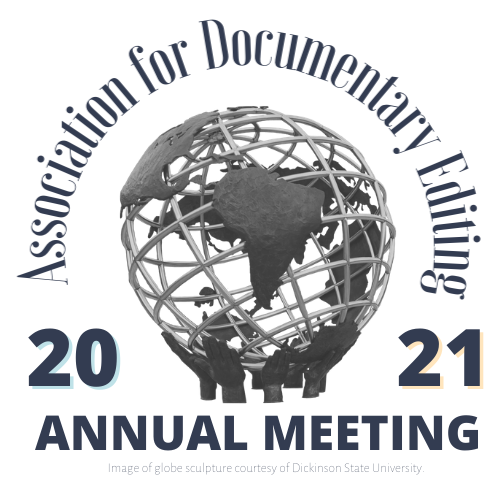ADE Virtual Annual Meeting: Representation and Recovery

ADE Virtual Annual Meeting: Representation and Recovery
24-27 June, and 6, 13, 20 and 27 July 2021
ADE conference organizers have decided to consider the current moment as an opportunity to reexamine the objectives of an annual conference. The events of 2020 highlight a long-standing threat to our multifaceted cultural heritage, including the absence of equitable representation. Black people, Indigenous peoples, the Global South, and other marginalized groups are underrepresented within the fields of editing and archival and community-based curation and recovery. This symptom of wider systemic and institutional racism has produced a needful social reckoning. As one of many groups participating in scholarly and public communication, we have decided to extend the conference to a series of public forums that address such inequities.
Likewise, we will ask all members and participants to acknowledge a code of professional conduct statement in advance of the conference’s convenings, designed to ensure inclusivity and respectful and supportive discourse—regardless of individuals’ career position, age, discipline, race, ethnicity, nationality, ability, position on and expression of faith, gender identity, actual or perceived sex, gender expression, sexual orientation, and marital or veteran status.
From 24-27 June, we will hold sessions required by ADE’s governance and in partnership with the Theodore Roosevelt Center at Dickinson State University, the previously designated location of the 2021 conference. Registration fees follow:
- Patron: $25 (or more)
- Standard: $20
- Student, Retired, Independent Scholars: $10
- Pay What You Can: $0-$10
To facilitate interdisciplinary conversations on the CFP theme, in July we will feature both webinars and a keynote. These sessions are free.
Roopika Risam will deliver the keynote address: “Beyond the Blacklist: Reanimating Intersectional Feminist Media Histories.”
How can critical digital editions contribute to the essential work of intersectional feminist recovery? This question is at the heart of Reanimate, an intersectional feminist publishing collective that recovers writing by women in media industries whose radical politics led to their sidelining in the 1950s. Risam will discuss the origins and goals of the Reanimate collective and the challenges she and her collaborators have encountered as they have produced critical digital editions of marginalized women’s writing, raising broader questions about the affordance and limitations of digital cultural recovery.
Roopika Risam is Chair of Secondary and Higher Education and Associate Professor of Education and English at Salem State University. She is the author of New Digital Worlds: Postcolonial Digital Humanities in Theory, Praxis, and Pedagogy (2018) and co-editor of Intersectionality and Digital Humanities (2019) and The Digital Black Atlantic (2021). Her digital projects include Reviews in Digital Humanities, a journal that peer reviews digital scholarship, and Reanimate, an intersectional feminist recovery publishing collective.
CALL FOR PROPOSALS
Well-funded digital archives have energized the field of documentary and scholarly editing, yet the recovery of content by women, Indigenous people, Black people, People of Color, and other underrepresented groups has suffered setbacks since the 1990s. For editing and other communities, the recovery of marginalized voices was long hampered by funding sources that focused interest on well-known and canonical historical figures. And even though the interests of funding organizations have shifted in the context of changing technologies and constituencies, the field has been slow to respond. Increasingly, however, new funding sources and technologies are enabling documentary editors, textual scholars, historians and other interdisciplinary scholars, educators, genealogists, family historians, students, librarians, archivists, church historians and other community groups to bring marginalized voices and artifacts to light.
The ADE Program Committee solicits presentations for panels and individual papers on recovery broadly, including efforts of small-scale projects; rare or marginal texts; texts and artifacts produced by women, Indigenous people, Black people, People of Color and other marginalized groups; texts that dislodge the single author model; the exploration of the ways in which scholarly editions, archives, and pedagogical recovery projects can avoid reproducing colonization/marginalization; the ways in which editors can offer context to historically famous figures to avoid placing them on a pedestal; and the role that new technologies, social media environments, editorial institutes, and community groups play in advancing these objectives. We welcome projects and individuals in all disciplines and at any stage of their career, as well as those who engage in public history and advancing knowledge beyond the academy.
Please submit inquiries and 300-word abstracts and brief bio(s) to Noelle Baker (noelle.baker@me.com) by 1 March 2021.
Potential topics include but are not limited to:
- Initiatives to support peer review of and recovery work by marginalized figures
- Editing and minimal computing in the Global South
- Community recovery work
- Teaching with recovered materials in K-12 classrooms
- Digital technologies, accessibility, and the broadening/democratizing of knowledge
- Recovering hidden voices and stories through their interactions with canonical figures
- Editors’ responsibility to engage with emerging scholarship adjacent to their figures
- Decolonializing archives, records, and editions (including but not restricted to metadata, bibliographies, and indexing) for the discoverability of marginalized and underrepresented groups
- Challenges and strategies in placing historic (and imperfect) figures in context in 2021
- Editorial institutes and expansive definition(s) of what constitutes digital recovery
- Editorial treatment of understudied documents for which encoding is scholarship
- Pedagogical experiments with micro editions and recovery
- Teaching an imperfect past in 2021
- Decolonialized approaches to recovery
- Social editions, new platforms, and more democratic models of recovery
- Creating discoverability for underrepresented individuals via county/state sheriffs’ records, professional licensing records, store ledgers, and other related records
ADE Program Committee and Consultants
- Noelle Baker, Chair
- Katie Blizzard
- Debbie Bloom
- Dale Brenneman
- Sara Brumfield
- Julian Chambliss
- Tom Downey
- Amy Earhart
- Kathryn Gehred
- Robb Haberman
- Beth Luey
- Sharon Kilzer
- David Nolen
- Kathryn Tomasek
The image of the globe that appears in the program logo references a sculpture located in the International Flag Plaza at the campus of the virtual host Dickinson State University in Dickinson, ND. Image of the sculpture is courtesy of Dickinson State University.